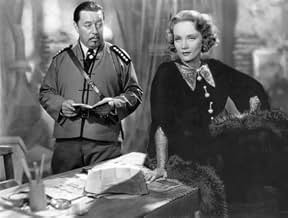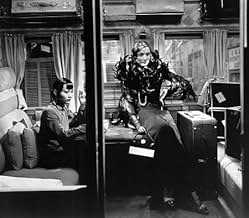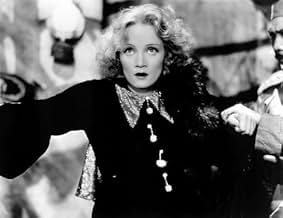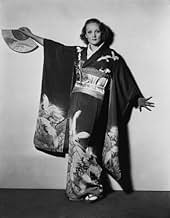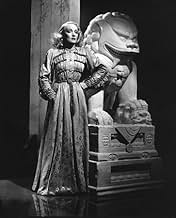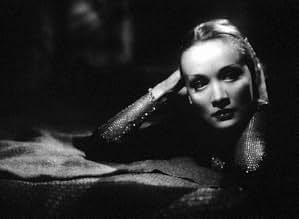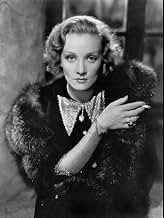Una mujer reconecta con un antiguo amante durante un peligroso viaje en tren hacia Shanghai.Una mujer reconecta con un antiguo amante durante un peligroso viaje en tren hacia Shanghai.Una mujer reconecta con un antiguo amante durante un peligroso viaje en tren hacia Shanghai.
- Dirección
- Guión
- Reparto principal
- Ganó 1 premio Óscar
- 2 premios y 2 nominaciones en total
- Dr. Professor Jack
- (sin acreditar)
- Minor Role
- (sin acreditar)
- Carey
- (sin acreditar)
- Chinese Soldier
- (sin acreditar)
- Chinese Officer Checking Passports
- (sin acreditar)
- British Officer at Shanghai
- (sin acreditar)
- British Railway Officer
- (sin acreditar)
- Undetermined Secondary Role
- (sin acreditar)
- Train Engineer
- (sin acreditar)
Reseñas destacadas
Set in Kuomintang China, the film concentrates on a group of train passengers making a journey from Peking to Shanghai. These are the white passengers all heading for their extraterritorial enclaves on the China coast and a couple of richer Chinese. One of them is Warner Oland who is a seemingly respectable Chinese merchant, but actually a notorious warlord leader a group that Chiang Kai-Shek has sworn to exterminate. In fact during this period his government was doing just that.
Oland is best known for playing Chinese detective Charlie Chan, but he's not dispensing fortune cookie wisdom here. He's a most menacing figure who when he's revealed holds all the lives of the passengers in his hands. The other Oriental in this group is well to do prostitute Anna May Wong. She and Dietrich find themselves kindred spirits and are shunned by the other passengers.
It's a reunion of sorts for Dietrich, another of the passengers is Clive Brook a British army doctor who is on his way to China to perform a delicate operation on a big shot. He and Dietrich were once involved, but when he dumped her, she took the road that made her the notorious Shanghai Lily.
The main weakness of Shanghai Express in fact is Brook. He's such a cold fish drip of a man, I can't see how Dietrich and he could ever have been involved. The film would work a lot better if the role had been cast with someone of Douglas Fairbanks, Jr's charm. Still Brook proves the old flame hasn't quite died down and in fact it hasn't for Marlene either.
Other characters on the train are Lawrence Grant as a reverend Davidson type missionary, Louise Closser Hale as an old American dowager, Emile Chautard as a disgraced French Army officer, Gustave Von Seyfertitz as a hypocritical opium dealer, and Eugene Palette as a crass American businessman as only Eugene Palette can play them. They provide quite a cross section of the western powers who were nibbling on the Chinese body politic at the time.
Shanghai Express won an Oscar for Cinematography and was in the running for Best Picture that year, losing to Grand Hotel which has a lot of similarities to this film. Dietrich is unforgettable as Shanghai Lily and this is a must for her fans.
Essentially, the movie is Ms. Dietrich's star vehicle, kit up with astounding sartorial creations from Travis Banton, and looks gorgeously photogenic under von Sternberg's meticulous coordination, she plays a courtesan named Shanghai Lily, of all people, she chances upon her ex-lover, British Captain Donald "Doc" Harvey (a stiff upper-lipped Brook) on the express, while the pair's romance duly begins to rekindle, Chang and his rebellious rabble hijacks the train and detains Doc as a valuable hostage, soon, it falls to two women's hands to take the situation out of jeopardy, one is Shanghai Lily, who acquiesces to Chang's commander for the sake of Doc's safety, another is her companion, a Chinese working girl Hui Fei (a piercing-looking Wong, the first Chinese-American star in Hollywood), who successfully lands on her feet after a vengeful assassination.
Sardonically, the rest western passengers are more or less one-note laughing-stocks, casual scorn is cast upon an opium merchant and self-professed "invalid" Eric Baum (von Seyffertitz), a priggish Reverend Carmichael (Grant) and a congenital bettor Sam Salt (Pallette), whereas Henry Chang is accountable for all the contempt, conversely it is the gamble of love and faith that transpires after its torpid escape hubbub, and it is Shanghai Lily's clandestine repentance finally softens the film's cynical temperament and veers into the usual trajectory of a cheesy romance, but what an extravaganza is on show, von Sternberg's expressionistic idiom would totally normalize the standards we view movies even today, whether it concerns narrative cohesion, the marshaling of a huge set, or spectacular montage arrangements, no wonder audience at that time could rapturously fall under his spell, SHANGHAI EXPRESS is the highest grossing movie of 1932, even today, it demands our collective gaze.
Beautiful is not a big enough word enough to describe the cinematography in Shanghai Express. The plot is dreamlike and unrealistic (Sternberg hated realism), the costumes are excessive (impossible to contain in Dietrich's supposed luggage), the atmosphere is deliciously layered with decadence, exoticism (good part for Anna Mae Wong) and deterioration (broken walls, slats and fantasies), punctuated by von Sternberg's caprice (chickens wandering in front of the train -- a symbol of Dietrich's husband's profession as a chicken farmer?).
The storyline is basically a broken romance seeking to be healed between Clive Brook and Dietrich or "Shanghai Lily," the naughty lady who has sold her body the past few years to keep herself in glittery costumes and furs.
The real "story" is "Dietrich and von Sternberg visit China" on some movie lot, on their way from or to Russia (The Scarlet Empress), Spain (The Devil is a Woman), North Africa (Morocco), or somewhere in the U.S. (Blonde Venus).
Gorgeous and lots of fun!
Plot finds Shanghai Lily (Dietrich) meeting up with old flame Donald Harvey (Brooks) aboard the Shanghai Express during the Chinese Civil War in 1931. However, this train has many passengers with secrets to hide, so when some rebels ambush the train, such things as loyalties, friendships, hidden motives and the birthing of legends come to the fore.
Stylishly crafted by Sternberg and brisker than the other collaborations with Dietrich, Shanghai Express thrives on atmospheric visuals, strong scripting and a sultry turn from the leading lady. The cramped confines of the train allow Sternberg to dally with trademark shadows, smoke and shafts of light for maximum effect, garnering Garmes an Oscar in the process, while there is deft deadpannery amongst the myriad of intriguing characters.
Quality film making on both sides of the camera and also off of the writers desk. 8/10
Despite the fact that the entire film is produced in either a Hollywood lot or a train depot in San Bernardino, I feel that I am in China during very turbulent and dangerous times. Thanks to the special skills of director Josef von Sternberg, the prevailing sense of impending peril is very strong. Warner Oland, although not even half Chinese, is very convincing as the menacing rebel leader. The rest of the cast is excellent as well. Both Dietrich and Brook project an outward appearance of stiffness and toughness to the dangerous world around them, but we learn along the hazardous and uncertain journey that their exterior façade is nothing but a thin disguise, and there lies a very vulnerable humanity deep within both of them. Dietrich gives another one of her many fascinating performances, full of psychological complexity. I love her.
I don't understand all of the harsh criticism of Clive Brook among the user reviews here that he is too wooden and mechanical. That is exactly the way he was supposed to play the role of a military doctor living in a world full of danger and of extreme hostility that is specifically aimed at him and his uniform. If we watch him closely, we will observe the decent, compassionate man behind the uniform. I thought that Dietrich and Brook make a smashing couple, especially when their outward and superficial veneer crumbles before our very eyes. This is good stuff!
The beautiful and mysterious Ana May Wong also provides complexity and depth to her deceiving, outward impression as Lily's courtesan companion, Hui Fei. Again, we must not judge Hui Fei based on her exterior demeanor alone because deep within her lies a very brave and determined dedication to her country and to her society. Her exchanges with Mrs. Hegarty (Louise Closser Hale), the prim and proper boarding house owner, are most entertaining. I'm usually not focused on hairdos, but check these out, especially Hegarty's. Holy mackerel.
As you will see, none of the characters are what they seem to be at first glance. That is only part of what intrigues me about this movie. Please don't miss this extraordinary train, which only leaves the station on rare occasions. If you don't appreciate the ride as much as I do, you can always get off when the next cow decides to wander into its path but, considering the danger lurking in every direction, you will probably be safer on it than off it. Be forewarned and sit tight until the end. You won't be disappointed.
¿Sabías que...?
- CuriosidadesThe extras in the film mostly speak Cantonese - a Chinese dialect used mainly in southern China. If the film were to be more accurate, the extras would speak Mandarin, but most Chinese residents in the Los Angeles area (who worked as film extras) spoke Cantonese, necessitating Josef von Sternberg use Cantonese. Even so, Cantonese was spoken by a lot of Chinese as Mandarin gradually gained ground.
- PifiasThe film is set in northern China (Peking to Shanghai). The government and warlord soldiers are speaking Taishanese, which is a southern Chinese dialect not generally spoken in northern China. The northern dialects of Mandarin Chinese (a Beijing dialect) and/or Shanghainese would be spoken instead.
- Citas
Mr. Henry Chang: All the money in the world can't wipe out his insult to me.
[Shanghai Lily tries to shoot him]
Mr. Henry Chang: You only had my interest before. Now you have my admiration. I could love a woman like you.
Shanghai Lily: You made me an offer to leave with you. Does it still hold good?
Mr. Henry Chang: I wouldn't trust you from here to the door. What assurance have I you won't trick me?
Shanghai Lily: I give you my word of honor.
Mr. Henry Chang: A man is a fool to trust any woman, but I believe a word of honor would mean something to you.
- Versiones alternativasComments in the AFI Catalogue suggest the credits were changed when re-released in 1935. According to the Catalogue, the original print referred to Harry Herveys work as a novel. In the viewed print on TCM, the onscreen credit was "story." The print was clearly a re-released print because of the PCA certificate number listed onscreen; such numbers were not issued until 1934. It is not known what other changes were made, if any, but the print ran only 82 minutes, suggesting some additional editing had been done.
- ConexionesFeatured in La huella del pasado (1935)
Selecciones populares
- How long is Shanghai Express?Con tecnología de Alexa
Detalles
- Fecha de lanzamiento
- País de origen
- Idiomas
- Títulos en diferentes países
- Shanghai Express
- Localizaciones del rodaje
- Empresa productora
- Ver más compañías en los créditos en IMDbPro
- Duración1 hora 22 minutos
- Color
- Relación de aspecto
- 1.37 : 1

